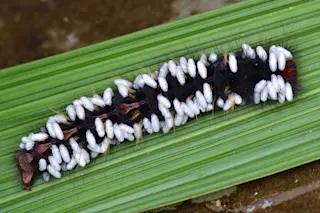Parasitoid wasps lay their eggs in or on their hosts. The wasps' larvae then consume the host, sometimes from the inside out.
Parasitoid wasps can be found on every single continent except Antarctica.
Some species have formed a defense against these parasitoid wasps. They may seem terrifying, but there is a way to prevent them from consuming their prey.
The Xenomorphs from the Alien movie franchise were inspired by parasitoid wasps. That doesn’t surprise Scott Egan, an evolutionary biologist at Rice University. He tells his students that if you can think of a weird interaction between creatures, then he’s pretty confident insects have evolved it at least once.
For those of us who don’t write horror, parasitoid wasps are not particularly inspiring, but they are undoubtedly fascinating. Learn more about these insects and their near-horror-inducing reproduction methods.
Parasitoids are organisms that lay their eggs in or on the bodies of ...















